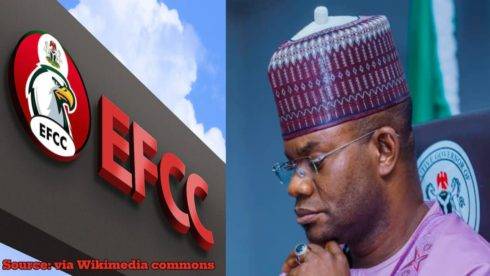In a dramatic turn of events, Ola Olukoyede, the Chairman of the Economic and Financial Crimes Commission (EFCC), has threatened to resign if he is not personally involved in overseeing the completion of the investigation regarding Yahaya Bello, the former governor. This bold statement comes amid mounting pressure on the EFCC to address allegations of corruption and financial misconduct against Bello. Ola Olukoyede’s insistence on direct involvement underscores the seriousness of the situation and the commitment of the EFCC to ensure transparency and accountability in its operations.
Ola Olukoyede’s ultimatum follows the former governor’s refusal to appear before the commission to address the charges leveled against him. Despite a direct phone call from Ola Olukoyede himself, urging Bello to cooperate with the investigation, the former governor has chosen to remain elusive. This defiance only serves to escalate tensions and further highlight the importance of a thorough and impartial inquiry into the allegations against Bello.
Governor Bello’s Allegations and Counterclaims
In a surprising twist, Governor Yahaya Bello has alleged that he summoned the EFCC to make an appearance in his village, suggesting a reversal of roles in the ongoing investigation. Bello’s assertion raises questions about the nature of the relationship between the former governor and the anti-corruption agency, adding another layer of complexity to an already contentious situation. The governor’s attempt to shift the focus onto the EFCC could be seen as a strategic maneuver to deflect attention from the allegations against him.
However, it remains to be seen whether Bello’s claims hold any merit or if they are merely an attempt to muddy the waters surrounding the investigation. The EFCC has yet to respond to Bello’s allegations, leaving room for speculation and conjecture about the true nature of the relationship between the commission and the governor.
Ola Olukoyede Mentions Importance of Public Support for the EFCC
Amidst the turmoil surrounding the investigation into Governor Yahaya Bello, EFCC Chairman Ola Olukoyede has emphasized the critical role of public support in the agency’s success. Olukoyede stressed that the EFCC’s ability to effectively combat corruption depends largely on the backing of the Nigerian people. He warned that any failure on the part of the EFCC would not only undermine its credibility but also have far-reaching consequences for Nigeria as a whole.
The chairman pointed to the positive impact of the EFCC’s ongoing efforts on the value of the Naira and the foreign exchange market, underscoring the importance of rooting out corruption for the country’s economic stability and growth. Ola Olukoyede’s plea for support serves as a reminder of the collective responsibility to combat corruption and uphold the rule of law in Nigeria.
Ola Olukoyede Highlights Challenges Facing the EFCC
Despite its mandate to tackle corruption head-on, the EFCC continues to face numerous challenges in fulfilling its mission. From political interference to bureaucratic red tape, the agency grapples with obstacles that hinder its ability to effectively carry out investigations and prosecute offenders. The case involving Governor Yahaya Bello is just one example of the uphill battle the EFCC faces in its fight against corruption.
Furthermore, the lack of adequate resources and personnel poses significant limitations on the EFCC’s capacity to address the widespread problem of corruption in Nigeria. Without sufficient support from the government and the public, the EFCC risks being overwhelmed by the scale and complexity of the challenges it confronts on a daily basis.
Ola Olukoyede Emphasizes Transparency and Accountability in Governance
The ongoing investigation into Governor Yahaya Bello serves as a stark reminder of the need for transparency and accountability in governance. As public servants entrusted with the welfare of the Nigerian people, elected officials must be held to the highest standards of integrity and ethical conduct. The EFCC’s efforts to hold Bello accountable for his alleged misdeeds underscore the importance of enforcing the rule of law and ensuring that no one is above scrutiny.
At a time when public trust in government institutions is at an all-time low, the EFCC’s commitment to pursuing justice without fear or favor is crucial for restoring faith in Nigeria’s democratic institutions. Only through a concerted effort to root out corruption and promote transparency can Nigeria hope to achieve its full potential and prosper as a nation.
Ola Olukoyede, EFCC Chairman Reiterates the Importance of Fairness, Impartiality and Due Process
As the investigation into Governor Yahaya Bello continues to unfold, it is imperative that all parties involved adhere to the principles of fairness, impartiality, and due process. The EFCC must remain steadfast in its commitment to uncovering the truth and holding those responsible for corruption to account. Likewise, Governor Bello and other individuals implicated in the investigation must cooperate fully with the authorities and respect the rule of law.
Ultimately, the outcome of this investigation will have far-reaching implications for Nigeria’s fight against corruption and its quest for good governance. By upholding the principles of transparency and accountability, the EFCC can send a clear message that no one is above the law and that corruption will not be tolerated in any form. As the nation watches closely, the EFCC must demonstrate its unwavering dedication to justice and integrity, regardless of the challenges it may face along the way.
Table of Contents
Discover more from OGM News NG
Subscribe to get the latest posts sent to your email.














